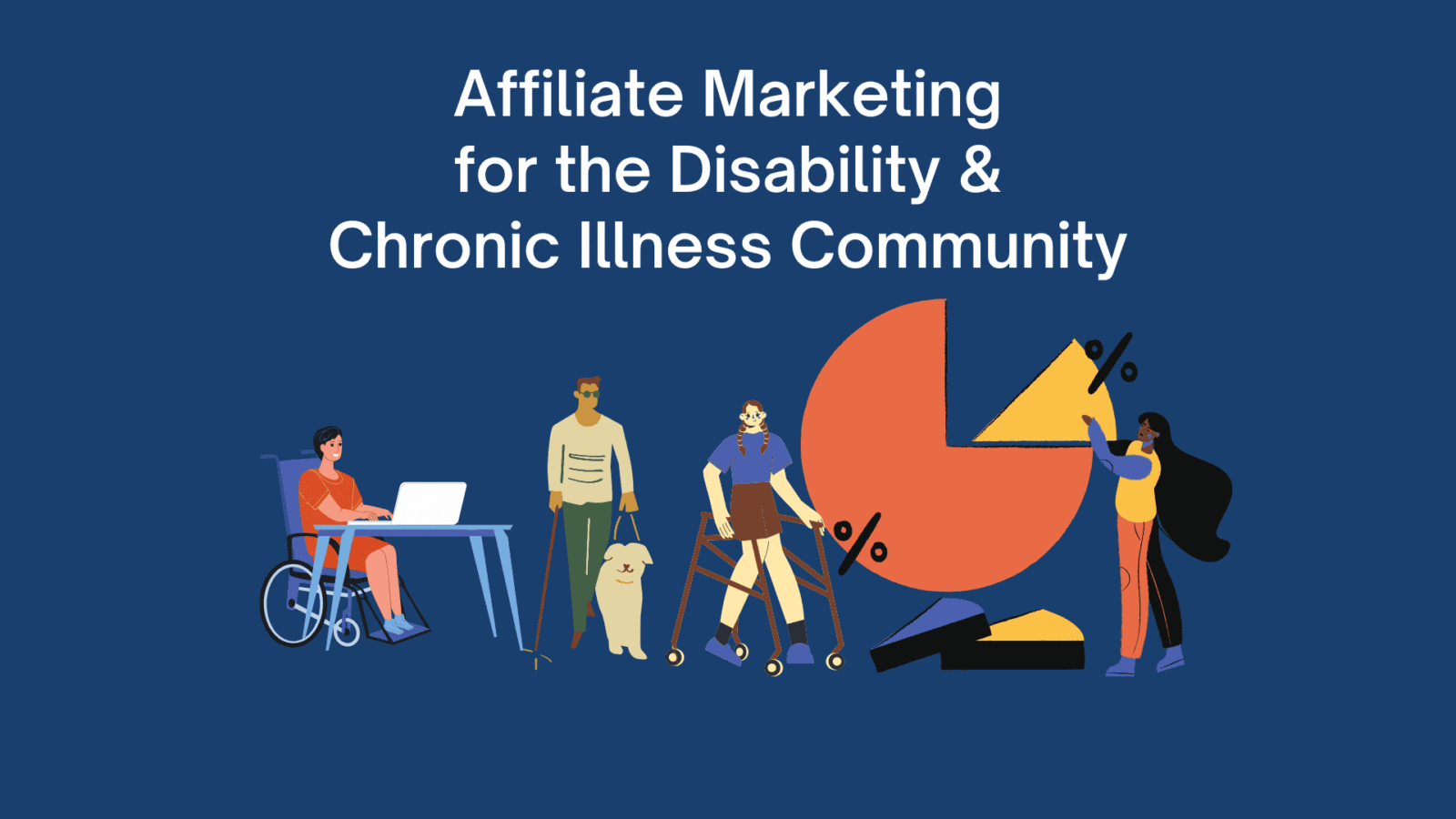
If you are a small business owner, blogger, or social media influencer who lives with a chronic illness, mental health condition, and/or disability, you’re probably looking for ways to make money and reach more customers. Internet marketing gets more complicated every year, and it can be difficult to decide on the best ways to gain followers or monetize your traffic. If you want to know more about affiliate marketing and whether it could help you grow your business, you're in the right place!
There are lots of guides to affiliate marketing out there, but most of them are focused on able-bodied people who are digital nomads or just want to work from home. For small business owners with health conditions, working from home is often a necessity, not a choice, so we have tried to address the specific needs and considerations of our community that other articles may not take into account.
This article contains affiliate links. As an Amazon associate, we earn from qualifying purchases.
Guide to Affiliate Marketing for the Disability Community
What is affiliate marketing?
Affiliate marketing is an advertising partnership between a business and website owners and/or social media influencers to promote products or services. A business sets up an affiliate program, an affiliate promotes or links to a product, a customer buys that product, and the affiliate gets a percentage of the sale.
The most common way for affiliate sales to be tracked is via links. An affiliate link is a special link that tracks where a customer came from and when, typically using cookies. If the customer buys something within a specified timeframe, the advertiser gets a commission.
Some affiliate programs use special pages on the company website or a discount code for customers to enter at checkout. These kinds of affiliate promotions are more common on podcasts and in other situations where customers are not visiting a page with a link.
Affiliate commissions are The Ability Toolbox's primary source of funding. You can see examples of our shopping guides that contain affiliate links here and here.
How much commission does the advertiser or influencer earn per sale with affiliate marketing?
The percentage of each sale can vary from 1% up to 50% or more depending on the company and the product. The timeframe for a sale to count can range from 24 hours for Amazon to 30 days for Etsy and many smaller businesses. If you are selling your merchandise on a large platform that has an affiliate program, those costs are already taken into account in the fees that platform charges you. If you want to set up an affiliate program on your own site, you can decide what percent commission to pay. We recommend paying 10% commission within 30 days of a click as a good balance between advertiser incentive and profit, but 5% or more will attract advertisers.
Is affiliate marketing the same as multilevel marketing?
Not at all. Multilevel marketing may sound similar at first, but the most important difference is that affiliate marketing has a single level, while multilevel marketing is a pyramid — hence the term “pyramid scheme.” The reason multilevel marketing is so predatory is that it focuses on developing a “downline” — getting other people to sign up for the company. Participants make most of their money by signing up other people, not from the products themselves, so only those at the top of the pyramid profit.
It’s the opposite with affiliate marketing. Your focus is on selling the products. Some affiliates will pay you a commission if someone signs up for their affiliate program through your link, but it’s a one-time event, not ongoing income based on that person's sales.
Multilevel marketing typically requires sellers to pay a signup fee and/or purchase inventory that costs hundreds or even thousands of dollars. Research shows that the vast majority of MLM distributors lose money. Affiliate programs are free to join because the business wants you to promote their products, and they handle the shipping. Affiliate marketing is practically risk-free for the affiliate because the worst that could happen is that you don’t sell anything.
The Ability Toolbox strongly opposes MLMs because of how they prey on disabled people and their family members who need a work-from-home job.
Is affiliate marketing worth it for disabled-owned businesses?
Yes, it is. When you run a business, it can be difficult to get people to promote you, even if they like your products. If you have an affiliate program, they have a built-in incentive to mention and link to you often. You exchange a small percentage of your profits for what amounts to free advertising.
Within the disability and mental health community, affiliate programs provide a way for us to help each other. We all know how high the unemployment rate is for people like us, and that’s why many of us start our own businesses. If you sell a product or service, you need customers, and if you have a blog or social media following, you need a source of income. It’s a win-win.
Affiliate marketing can also help you reach new audiences. If you join an affiliate network, people will find your program through its directory and sign up, bringing new customers who may have never heard of your business before.
I am a small business owner with a disability or health condition. How do I set up an affiliate program for influencers to promote my products or services?
As a business owner, you have several options for setting up an affiliate program. Let’s go over them so you can get an idea of which might be right for you.
1. Sell your merchandise on a platform that already has an affiliate program.
Amazon and Etsy have affiliate programs, so if you list your items on either of those platforms, you will automatically be enrolled in their programs. If you design merchandise, some print-on-demand services have affiliate programs.
2. Set up an affiliate program through one of the major affiliate networks.
An affiliate network is a company that manages affiliate programs for businesses. Affiliate networks charge a fee and/or take a cut of each sale, but they handle everything else for you, including sending tax forms to your affiliates. Affiliate networks make it easy for website owners to find you and join your program since they may already have an account with the network.
We recommend Share a Sale or Awin, two very easy-to-use and popular affiliate networks.
3. Set up your own self-managed affiliate program on your website.
Shopify and WooCommerce have affiliate plug-ins available. These can be less expensive or even free, but you have to manage the financial side and that can be a hassle.
I am a blogger or influencer with a health condition. Could I make money with affiliate marketing?
Absolutely! Affiliate marketing can be a great side hustle or a way to earn a bit of money if a traditional job would be difficult due to your health. However, it's not a path to get rich quick — you have to put in time and effort to make a full-time income, and even then, there are no guarantees. It's best to diversify and monetize through a combination of affiliate links, ads, sponsors, donations, etc.
What is a niche in affiliate marketing?
A niche is a topic, or more precisely, a subtopic around which you focus the content of your website or social media presence. Niches can be general, like health, or specific, like health tips for people with lupus. It’s very difficult to succeed in a large and competitive niche like health where there are already several established authorities, such as Healthline and WebMD. But you'll have a much easier time finding a dedicated audience for a website about a more specific niche like lupus and health.
Niches can also be a combination of a topic and an audience, such as health tips for the LGBTQ community or video games for senior citizens. The Ability Toolbox's niche is empowerment, practical advice, and peer support for people with disabilities, chronic illnesses, and mental health conditions. Our niche is somewhat large, however, there aren’t many companies doing SEO and developing websites for the disability community, so we have been able to build some traffic without a large financial investment.
As a writer, one of the most common pieces of advice we give and receive is, “Write what you know.” What you know and are passionate about is your niche. Your niche can be about your health or identity or something totally unrelated. It's your choice!
Most affiliate marketing advice blogs recommend choosing a niche that isn’t too competitive, especially for your first website or project. Since the disability niche has a lot of room for growth, if you want to create content related to disability, you could combine disability with your profession or a favorite hobby. For example, you could create a website with product guides and advice for musicians with disabilities, or a TikTok where you review accessible beauty products.
There are thousands of affiliate programs covering just about every product or service you can think of from insurance to sports to electronics. The programs you choose to enroll in will be based on your niche. But don’t get ahead of yourself… Before joining any affiliate programs, you should have an established website and/or social media following. Most affiliate programs check out applicants before accepting them to make sure they will be good representatives for the brand. If your website is not professional-looking or if you only have a few social media followers, you may not be approved.
Amazon is the largest affiliate program, but they also have more rules compared to many other programs. If you are a new affiliate, you are required to get three sales in your first three months to stay in the program. Amazon also has strict rules about tricking or pushing people into clicking links, so you can’t buy from your own links or ask people to buy items through them directly.
Etsy has an excellent affiliate program that pays better than Amazon and allows you to promote many artisans with disabilities and mental health conditions. We highly recommend Etsy’s program if it fits with the kinds of products you want to promote. Awin manages the Etsy affiliate program.
Share a Sale and Awin are affiliate networks that manage programs for many businesses. If you sign up with them, you'll be able to easily apply for lots of affiliate programs and get combined commissions paid to you once or twice a month.
What are affiliate disclosures and why do I need them as a disabled blogger or influencer?
An affiliate disclosure is a brief statement that explains your financial relationship with the companies whose products or services you promote. If you received a free product in exchange for a review or receive a commission on sales generated through an affiliate link or discount code, you have to inform readers/listeners/watchers.
Affiliate disclosures are required by the FTC in the USA and by the GDPR for EU countries. Affiliate programs also generally require that their affiliates use a disclosure. A few require a specific disclosure; for example, Amazon requires you to state: “As an Amazon associate, [I/we] earn from qualifying purchases.” You'll see affiliate disclosures here on The Ability Toolbox; in fact, there's one on this page.
Affiliate disclosures promote truth in advertising and allow your audience to have the full picture when deciding whether to trust your recommendations. You might worry about whether your followers will question your honesty if they know you use affiliate links, but in our experience, it's never been an issue. If you are creating detailed reviews of products with pros, cons, and comparisons, you're empowering people to make their own decisions about whether a product is right for them. Plus, there are so many affiliate programs and products that there is no need for anyone to recommend something they don't actually like. A few do, of course, but the vast majority of affiliates promote the products they love within their niche.
If I make money from affiliate marketing as a blogger or influencer, will I lose my disability benefits?
Probably not, but you'll need to proceed carefully. Affiliate income is not “under the table,” so you'll need to consider its impact on your disability benefits. In the United States, affiliate commissions over $600 are reported as contractor (1099-MISC) payments which are considered earned income and taxed. If you live in the EU, you'll need to submit a quarterly MOSS report and pay VAT.
In the United States, both federal disability programs, SSDI and SSI, allow you to earn some income while receiving benefits, although SSDI has fewer restrictions. Many states also have working disabled programs, which allow people to work without losing Medicaid. Disability Benefits 101 is a great website where you can learn about working without losing Medicare and Medicaid. If your state is not listed, Google “working disabled [your state]” and you'll find the info you need.
Do you want to learn more about affiliate marketing for small business owners and bloggers with disabilities?
Share your thoughts and questions in the comments and we’ll try our best to answer.
The Ability Toolbox is a lifestyle and self-help community for people with disabilities and chronic illnesses.








